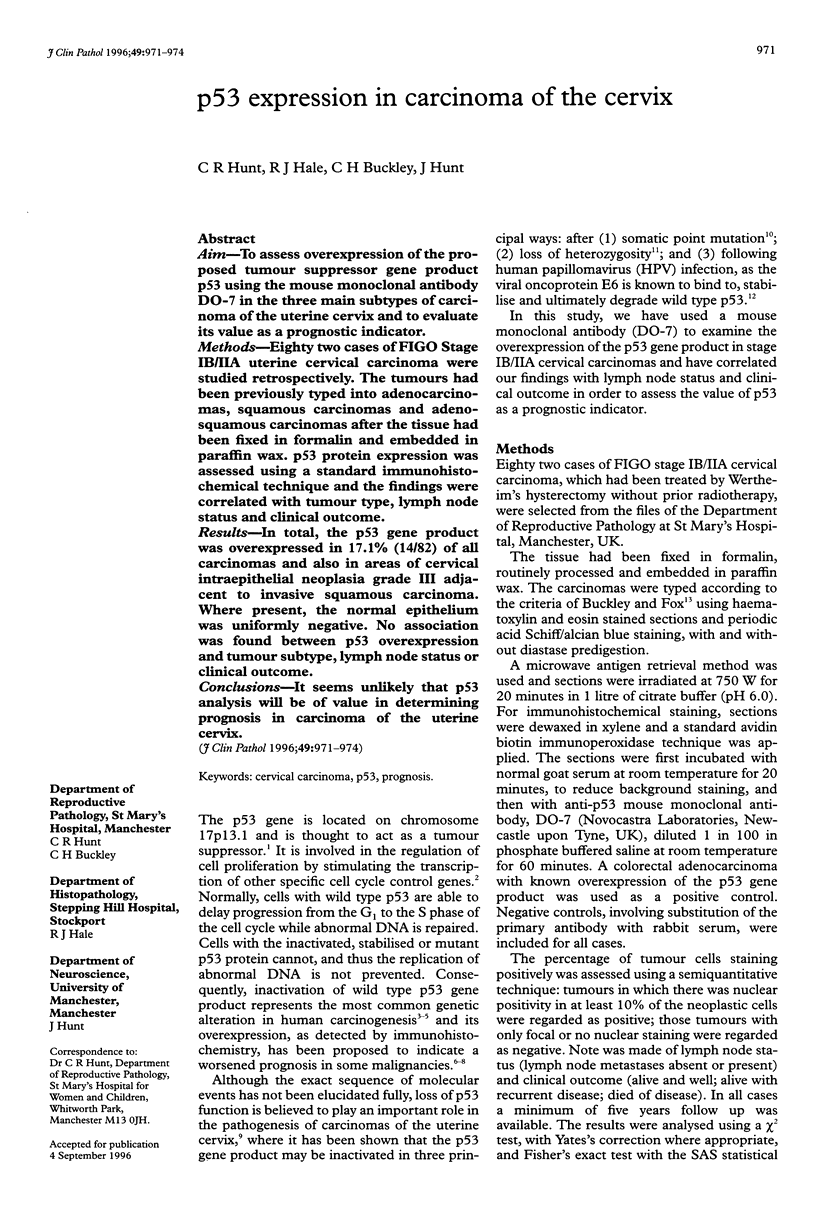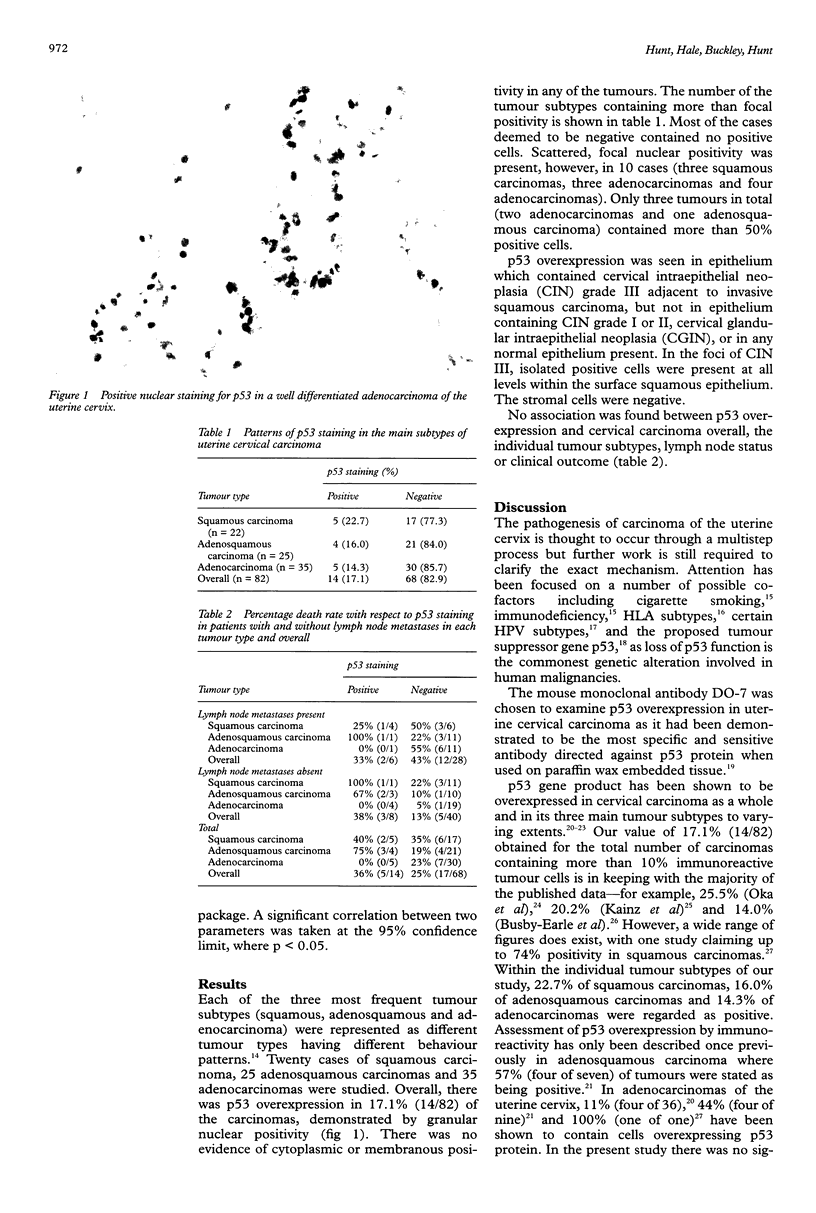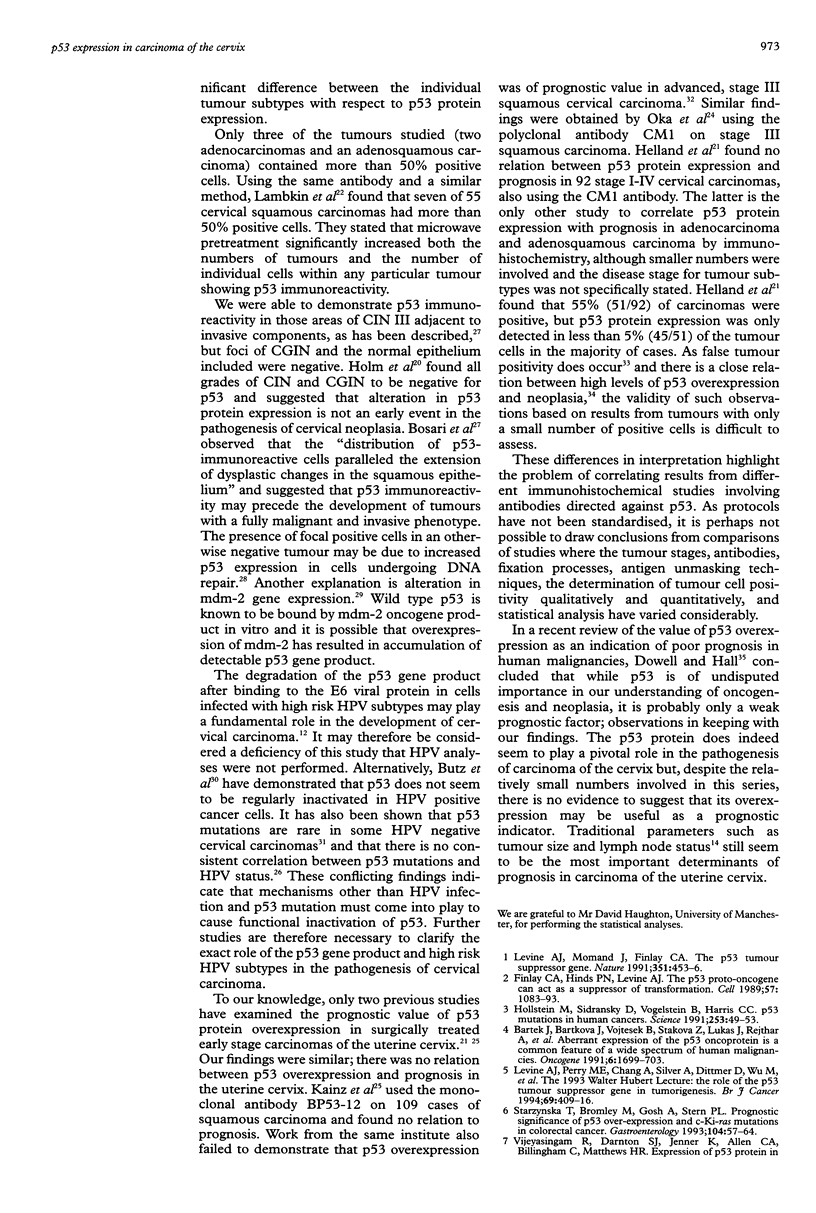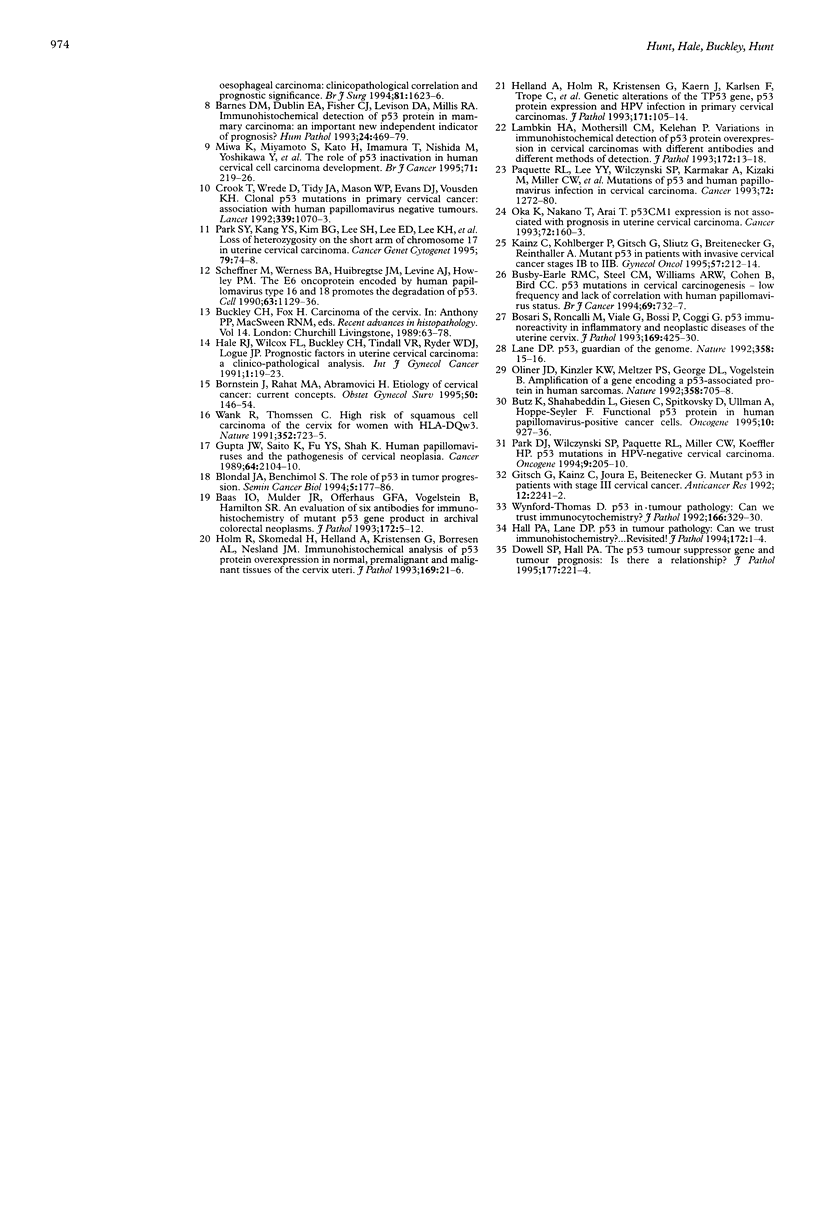Abstract
AIM: To assess overexpression of the proposed tumour suppressor gene product p53 using the mouse monoclonal antibody DO-7 in the three main subtypes of carcinoma of the uterine cervix and to evaluate its value as a prognostic indicator. METHODS: Eighty two cases of FIGO Stage IB/IIA uterine cervical carcinoma were studied retrospectively. The tumours had been previously typed into adenocarcinomas, squamous carcinomas and adenosquamous carcinomas after the tissue had been fixed in formalin and embedded in paraffin wax. p53 protein expression was assessed using a standard immunohistochemical technique and the findings were correlated with tumour type, lymph node status and clinical outcome. RESULTS: In total, the p53 gene product was overexpressed in 17.1% (14/82) of all carcinomas and also in areas of cervical intraepithelial neoplasia grade III adjacent to invasive squamous carcinoma. Where present, the normal epithelium was uniformly negative. No association was found between p53 overexpression and tumour subtype, lymph node status or clinical outcome. CONCLUSIONS: It seems unlikely that p53 analysis will be of value in determining prognosis in carcinoma of the uterine cervix.
Full text
PDF



Images in this article
Selected References
These references are in PubMed. This may not be the complete list of references from this article.
- Baas I. O., Mulder J. W., Offerhaus G. J., Vogelstein B., Hamilton S. R. An evaluation of six antibodies for immunohistochemistry of mutant p53 gene product in archival colorectal neoplasms. J Pathol. 1994 Jan;172(1):5–12. doi: 10.1002/path.1711720104. [DOI] [PubMed] [Google Scholar]
- Barnes D. M., Dublin E. A., Fisher C. J., Levison D. A., Millis R. R. Immunohistochemical detection of p53 protein in mammary carcinoma: an important new independent indicator of prognosis? Hum Pathol. 1993 May;24(5):469–476. doi: 10.1016/0046-8177(93)90158-d. [DOI] [PubMed] [Google Scholar]
- Bell S. M., Scott N., Cross D., Sagar P., Lewis F. A., Blair G. E., Taylor G. R., Dixon M. F., Quirke P. Prognostic value of p53 overexpression and c-Ki-ras gene mutations in colorectal cancer. Gastroenterology. 1993 Jan;104(1):57–64. doi: 10.1016/0016-5085(93)90835-z. [DOI] [PubMed] [Google Scholar]
- Blondal J. A., Benchimol S. The role of p53 in tumor progression. Semin Cancer Biol. 1994 Jun;5(3):177–186. [PubMed] [Google Scholar]
- Bornstein J., Rahat M. A., Abramovici H. Etiology of cervical cancer: current concepts. Obstet Gynecol Surv. 1995 Feb;50(2):146–154. doi: 10.1097/00006254-199502000-00027. [DOI] [PubMed] [Google Scholar]
- Bosari S., Roncalli M., Viale G., Bossi P., Coggi G. p53 immunoreactivity in inflammatory and neoplastic diseases of the uterine cervix. J Pathol. 1993 Apr;169(4):425–430. doi: 10.1002/path.1711690407. [DOI] [PubMed] [Google Scholar]
- Busby-Earle R. M., Steel C. M., Williams A. R., Cohen B., Bird C. C. p53 mutations in cervical carcinogenesis--low frequency and lack of correlation with human papillomavirus status. Br J Cancer. 1994 Apr;69(4):732–737. doi: 10.1038/bjc.1994.138. [DOI] [PMC free article] [PubMed] [Google Scholar]
- Butz K., Shahabeddin L., Geisen C., Spitkovsky D., Ullmann A., Hoppe-Seyler F. Functional p53 protein in human papillomavirus-positive cancer cells. Oncogene. 1995 Mar 2;10(5):927–936. [PubMed] [Google Scholar]
- Bártek J., Bártková J., Vojtesek B., Stasková Z., Lukás J., Rejthar A., Kovarík J., Midgley C. A., Gannon J. V., Lane D. P. Aberrant expression of the p53 oncoprotein is a common feature of a wide spectrum of human malignancies. Oncogene. 1991 Sep;6(9):1699–1703. [PubMed] [Google Scholar]
- Crook T., Wrede D., Tidy J. A., Mason W. P., Evans D. J., Vousden K. H. Clonal p53 mutation in primary cervical cancer: association with human-papillomavirus-negative tumours. Lancet. 1992 May 2;339(8801):1070–1073. doi: 10.1016/0140-6736(92)90662-m. [DOI] [PubMed] [Google Scholar]
- Dowell S. P., Hall P. A. The p53 tumour suppressor gene and tumour prognosis: is there a relationship? J Pathol. 1995 Nov;177(3):221–224. doi: 10.1002/path.1711770302. [DOI] [PubMed] [Google Scholar]
- Finlay C. A., Hinds P. W., Levine A. J. The p53 proto-oncogene can act as a suppressor of transformation. Cell. 1989 Jun 30;57(7):1083–1093. doi: 10.1016/0092-8674(89)90045-7. [DOI] [PubMed] [Google Scholar]
- Gitsch G., Kainz C., Joura E., Breitenecker G. Mutant p53 product in patients with stage III cervical cancer. Anticancer Res. 1992 Nov-Dec;12(6B):2241–2242. [PubMed] [Google Scholar]
- Gupta J. W., Saito K., Saito A., Fu Y. S., Shah K. V. Human papillomaviruses and the pathogenesis of cervical neoplasia. A study by in situ hybridization. Cancer. 1989 Nov 15;64(10):2104–2110. doi: 10.1002/1097-0142(19891115)64:10<2104::aid-cncr2820641022>3.0.co;2-n. [DOI] [PubMed] [Google Scholar]
- Helland A., Holm R., Kristensen G., Kaern J., Karlsen F., Trope C., Nesland J. M., Børresen A. L. Genetic alterations of the TP53 gene, p53 protein expression and HPV infection in primary cervical carcinomas. J Pathol. 1993 Oct;171(2):105–114. doi: 10.1002/path.1711710207. [DOI] [PubMed] [Google Scholar]
- Hollstein M., Sidransky D., Vogelstein B., Harris C. C. p53 mutations in human cancers. Science. 1991 Jul 5;253(5015):49–53. doi: 10.1126/science.1905840. [DOI] [PubMed] [Google Scholar]
- Holm R., Skomedal H., Helland A., Kristensen G., Børresen A. L., Nesland J. M. Immunohistochemical analysis of p53 protein overexpression in normal, premalignant, and malignant tissues of the cervix uteri. J Pathol. 1993 Jan;169(1):21–26. doi: 10.1002/path.1711690105. [DOI] [PubMed] [Google Scholar]
- Kainz C., Kohlberger P., Gitsch G., Sliutz G., Breitenecker G., Reinthaller A. Mutant p53 in patients with invasive cervical cancer stages IB to IIB. Gynecol Oncol. 1995 May;57(2):212–214. doi: 10.1006/gyno.1995.1127. [DOI] [PubMed] [Google Scholar]
- Lane D. P. Cancer. p53, guardian of the genome. Nature. 1992 Jul 2;358(6381):15–16. doi: 10.1038/358015a0. [DOI] [PubMed] [Google Scholar]
- Levine A. J., Momand J., Finlay C. A. The p53 tumour suppressor gene. Nature. 1991 Jun 6;351(6326):453–456. doi: 10.1038/351453a0. [DOI] [PubMed] [Google Scholar]
- Levine A. J., Perry M. E., Chang A., Silver A., Dittmer D., Wu M., Welsh D. The 1993 Walter Hubert Lecture: the role of the p53 tumour-suppressor gene in tumorigenesis. Br J Cancer. 1994 Mar;69(3):409–416. doi: 10.1038/bjc.1994.76. [DOI] [PMC free article] [PubMed] [Google Scholar]
- Miwa K., Miyamoto S., Kato H., Imamura T., Nishida M., Yoshikawa Y., Nagata Y., Wake N. The role of p53 inactivation in human cervical cell carcinoma development. Br J Cancer. 1995 Feb;71(2):219–226. doi: 10.1038/bjc.1995.47. [DOI] [PMC free article] [PubMed] [Google Scholar]
- Oka K., Nakano T., Arai T. p53CM1 expression is not associated with prognosis in uterine cervical carcinoma. Cancer. 1993 Jul 1;72(1):160–164. doi: 10.1002/1097-0142(19930701)72:1<160::aid-cncr2820720130>3.0.co;2-c. [DOI] [PubMed] [Google Scholar]
- Paquette R. L., Lee Y. Y., Wilczynski S. P., Karmakar A., Kizaki M., Miller C. W., Koeffler H. P. Mutations of p53 and human papillomavirus infection in cervical carcinoma. Cancer. 1993 Aug 15;72(4):1272–1280. doi: 10.1002/1097-0142(19930815)72:4<1272::aid-cncr2820720420>3.0.co;2-q. [DOI] [PubMed] [Google Scholar]
- Park D. J., Wilczynski S. P., Paquette R. L., Miller C. W., Koeffler H. P. p53 mutations in HPV-negative cervical carcinoma. Oncogene. 1994 Jan;9(1):205–210. [PubMed] [Google Scholar]
- Park S. Y., Kang Y. S., Kim B. G., Lee S. H., Lee E. D., Lee K. H., Park K. B., Lee J. H. Loss of heterozygosity on the short arm of chromosome 17 in uterine cervical carcinomas. Cancer Genet Cytogenet. 1995 Jan;79(1):74–78. doi: 10.1016/0165-4608(94)00103-i. [DOI] [PubMed] [Google Scholar]
- Scheffner M., Werness B. A., Huibregtse J. M., Levine A. J., Howley P. M. The E6 oncoprotein encoded by human papillomavirus types 16 and 18 promotes the degradation of p53. Cell. 1990 Dec 21;63(6):1129–1136. doi: 10.1016/0092-8674(90)90409-8. [DOI] [PubMed] [Google Scholar]
- Trusten W. Catching AIDS. Nature. 1992 Aug 27;358(6389):705–705. doi: 10.1038/358705d0. [DOI] [PubMed] [Google Scholar]
- Wank R., Thomssen C. High risk of squamous cell carcinoma of the cervix for women with HLA-DQw3. Nature. 1991 Aug 22;352(6337):723–725. doi: 10.1038/352723a0. [DOI] [PubMed] [Google Scholar]
- Wynford-Thomas D. P53 in tumour pathology: can we trust immunocytochemistry? J Pathol. 1992 Apr;166(4):329–330. doi: 10.1002/path.1711660402. [DOI] [PubMed] [Google Scholar]



